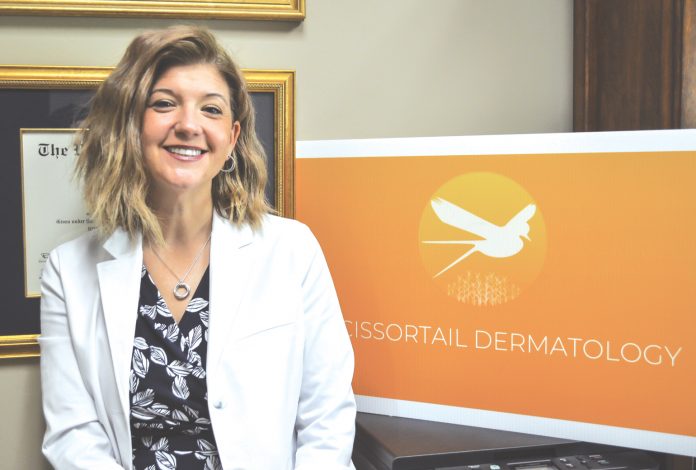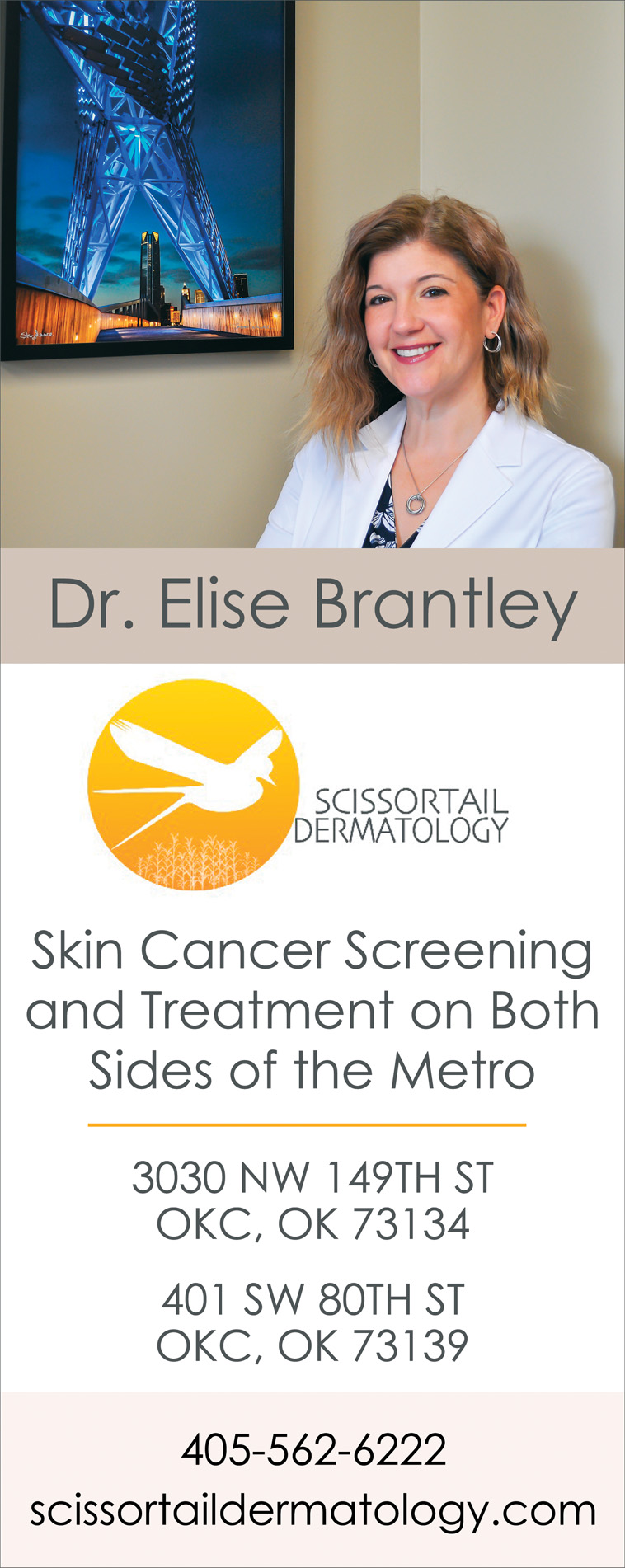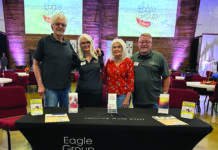story and photo by Bobby Anderson, Staff Writer
It’s all fun in the sun when you’re young.
But as you start to age all that exposure to the sun can begin to take its toll, resulting in blemishes and forms of skin cancer.
That’s where Dr. Elise Brantley and Scissortail Dermatology come in.
Brantley is a board-certified dermatologist who has been practicing since 2009.
Her practice focus is evaluation and treatment of growths of the skin with emphasis on detecting and treating skin cancer.
She is a native Oklahoman from Broken Arrow.
After graduating high school from the Oklahoma School of Science and Mathematics she attended the University of Tulsa for undergraduate studies.
She received her medical degree from the University of Oklahoma and completed her residency training at the University of Cincinnati where she served as chief resident.
While her husband was completing additional training in orthopedics she served on the faculty of both the University of Cincinnati and Emory University in Atlanta, Georgia before returning to Oklahoma.
She has been serving the Oklahoma City metro area for nearly 10 years.
She started Scissortail Dermatology this past September to better serve her patients.
“Over the years I’ve accumulated a practice of people who have had years of chronic sun exposure and a high rate of skin cancer development,” Brantley said. “Many of them are elderly because skin cancers come from years and years of sun exposure. It’s basically insult after insult after insult.”
Years of data have taught us about the harmful effects of the sun’s rays. Unfortunately, for many, that information wasn’t available when they needed it the most.
“We didn’t know then what we know now so when they were younger they were accumulating damage that no one had any idea how dangerous it was,” Brantley said. “Luckily, now, we have a lot more knowledge about how the sun’s rays cause damage but back then people just burned and kept going.”
Brantley has heard stories of patients trying to get sun tans when they were younger. Baby oil, Crisco, aluminum foil, iodine were just a few of the concoctions people thought might help them tan.
The wisdom of trying to get a “base tan” before the summer is also one that Brantley says is a myth. Base tans do not protect from sun damage or skin cancers.
Brantley educates her patients so they can become more knowledgeable about what to look out for.
She focuses on prevention and protection from the sun as well as skin cancer detection and treatment.
“It’s never a bad idea to come in and get a full body skin check from head to toe, at least for a start,” Brantley said. “We can look at your overall risk factors, your history and personal history and even clues from your skin as to how much sun damage you’ve already accumulated.”
“From there we can determine how often you should come in and we can go over how to detect things on your own.”
Three main types of skin cancer exist and some may have genetic components.
Non-melanoma skin cancers include basal cell and squamous cell cancers.
Melanomas are the quicker, more dangerous forms that – if left untreated – can become fatal.
“Those can take off within only a few weeks for the more aggressive ones,” Brantley said. “Anytime you have a brown spot or black spot that is not part of your normal skin that you don’t recognize or is behaving differently you definitely should come get that checked out sooner rather than later.”
“It doesn’t mean it’s melanoma. There’s a whole category of things that are benign that look similar but are hard to tell unless you are trained.”
It’s never too late to hedge your bet against skin cancer. Seeking shade and not being out in the hottest part of the days from 10 a.m. to 2 p.m. are recommended.
There is more SPF protective clothing now than ever before including hats and shirts.
Sunscreen with an SPF of 30 or higher is also a great idea, reapplied every two hours.
Brantley notes that seniors are also at a higher risk of damage as they age, particularly if they spend more time in the sun.
“The more you are in the sun the less effective your immune system is at fighting off skin cancer,” said Brantley, who also noted the benefits of getting Vitamin D from the sun can as readily be achieved through vitamin supplements. “If you are immune-compromised you can start growing more and more skin cancers as your system gets weaker.”
Keeping a watchful eye over her patients is something that brings her immense joy.
“It’s very satisfying how you can get to know someone young and develop a relationship and know these patients over years and years. I love that once you get established with patients you build that relationship and it’s a privilege to get to know someone throughout their entire life. It’s very much a part of who a patient is, not just what their skin looks like.”
You can visit Dr. Brantley at one of her two OKC offices, Collier Skin Cancer Center, 3030 NW 149th St, or 401 SW 80th St, Bldg D, Ste 101. You can make an appointment by calling (405) 562-6222 or visiting her website at www.scissortaildermatology.com















